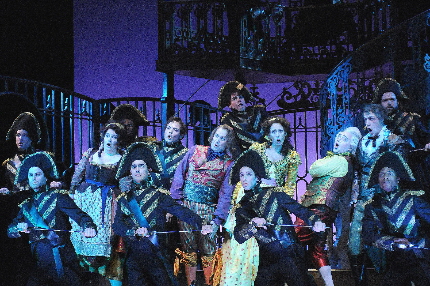By Bill Hirschman
In a third act rescue complete with a mysterious hero or heroine in the shadows, the Florida Grand Opera will continue to perform in Broward County next season, its leaders announced Monday.
The financially-challenged FGO did not quite raise the $600,000 that officials said they needed from individual donors to make continued performances in Broward fiscally responsible.
But an anonymous philanthropist who volunteered last month to match individual donors’ funds has agreed also to make up the $15,620 shortfall, a news release stated.
FGO has been reassessing all of its operations to stay solvent and feared that it would have to cancel its 2015-2016 season at the Broward Center for the Performing Arts – leaving the county without a large-scale opera production for the first time since 1943. FGO lost $125,000 in the 2013-2014 season as tickets sales ebbed in Broward.
FGO announced that it needed $600,000 to continue moving its productions from the Arsht Center for the Performing Arts in Miami up to Fort Lauderdale. Because the Broward Center had to lock in dates, the fund drive was only supposed to last until Jan. 31, but was extended two weeks when Broward Center officials said it could wait a little longer.
About $200,000 of the $600,000 had been identified as coming from previously dependable donors. But that left $400,000 to be addressed by new donations and the matching benefactor. Among the private donations were 68 new donors, FGO reported.
The number of productions in Broward has been cut back slightly over the years and the 2015-2016 season in Broward will only have two works: Rossini’s The Barber of Seville on Dec. 3 and 5, and Bellini’s Norma on Feb. 11 and 13.
“We are extremely glad to be bringing both The Barber of Seville and Norma to the BCPA next season. We are disappointed that we were unable to meet this attainable fundraising goal, but we are thrilled to welcome so many new donors to our family,” said General Director and CEO Susan T. Danis. “We hope to bring a full season of opera to the (Broward Center) in the future but the fundraising need will be great and hope to be able to count on the growing support of the community to keep opera in Broward.”
The underlying issue is money. With an operating budget of $8.6 million, FGO revealed last fall that it has not had a balanced budget since moving into the Arsht Center in 2006. It ran a $1.7 million deficit in the 2013-2014 season. The accumulated debt topped $19.4 million until recently when it sold off $19 million worth of properties including the Josephine Leiser Center in Fort Lauderdale.
One facet of that shortfall is that Broward-based contributions and ticket sales have been falling off for years, according to figures supplied by FGO.
In calendar year 2006, 1,614 sources in Broward donated $1.9 million; in calendar 2014, only 385 people or organizations donated $574,000. In calendar year 2006, more than 31,000 people bought tickets to five shows in Broward, earning $2.3 million; in calendar year 2014, more than 12,000 people attended four Broward shows, bringing in $918,000.
The cost of transporting and remounting the four shows in Broward during the 2013-2014 season left FGO with a $125,000 loss. “And there is a projected loss again this season. Given FGO’s delicate financial condition, this cannot be repeated,” Danis wrote in a news release Tuesday.
To combat the problems, FGO started $17.5 million SAY YES fundraising campaign to pay for a massive reorganization and rethinking of its specific programs over the next three years. Tuesday’s news release read, “Although public opinion of the Opera’s new efforts has been positive, the fundraising component of the “SAY YES!” campaign is progressing slower than planned. As a result the Opera has reevaluated its fundraising goals for the campaign and, therefore, its operations goals for upcoming seasons.
The pace of progress is mostly due to the fact that FGO’s slimmed back staff only has two people plus some board members who can make the one-on-one hands-on outreach needed to bring in large donors, Danis said.
Under Danis’ tenure since August 2012, FGO has trimmed its staff from 40 to 18, cutting its annual operating budget from a high of $22.2 million to $8.6 million, and cutting back both the number of operas in its main season and the number of performances in Miami and Fort Lauderdale.
The Greater Miami Opera organized in 1941 to operate in the Miami area. The Opera Guild of Fort Lauderdale opened in 1943, and the two merged in 1994 as the Florida Grand Opera, just as the Broward Center for the Performing Arts was opening.









 A PaperStreet Web Design
A PaperStreet Web Design

4 Responses to Florida Grand Opera To Stay In Broward Center In 2015-16